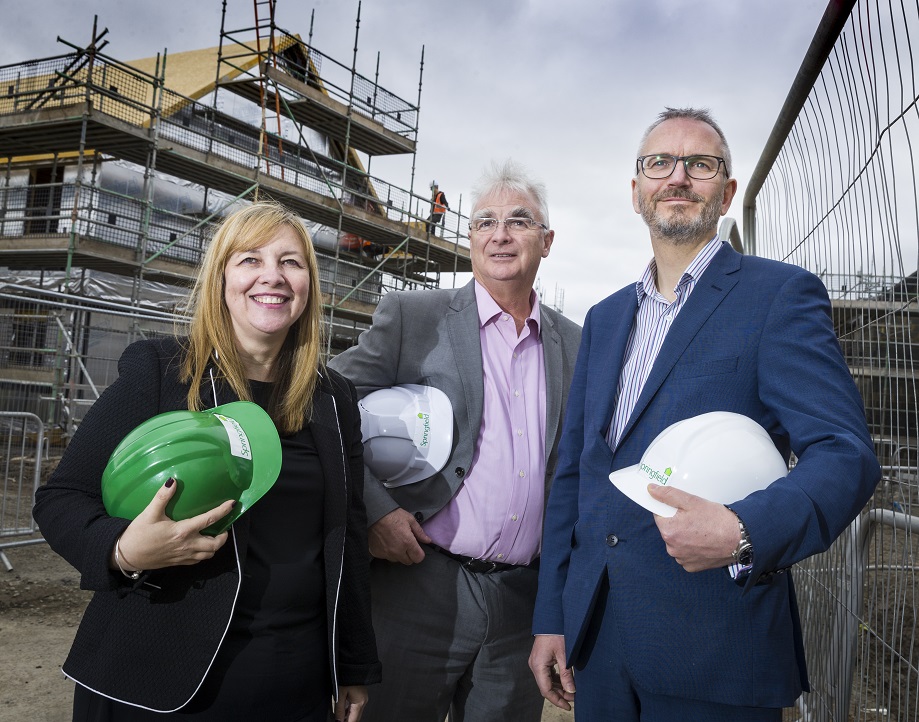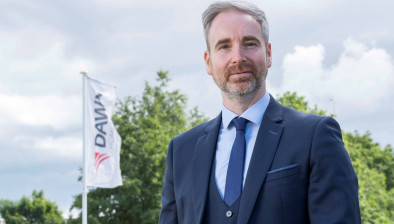Springfield Properties primed to capitalise on pent-up demand for larger homes
Despite a fall in profits, housebuilder Springfield Properties said today it is well placed to benefit from a significant increase in demand since resuming operations as buyers seek to move out of city centres and into larger homes with gardens.

(from left) Michelle Motion, chief financial officer with Sandy Adam, chairman, and Innes Smith, chief executive officer
Announcing its full year results for the twelve months ended 31 May 2020, the Elgin-based firm reported revenues of £144.4 million, down from £190.8m previously, while its operating profit of £12.1m was down from £17.6m.
The group said its results were impacted by the delivery of handovers scheduled for April and May 2020 being delayed due to the COVID-19 lockdown. For the previous two years, these months had accounted for 30% of the group’s annual revenue. With these sales contracted under the Scottish missive system, the revenue anticipated for the last two months of 2019/20 is expected to be recognised in the first half of the current financial year.
Despite this, Springfield achieved an improvement in gross margin and an adjusted profit before tax of £10.2m (2018/19: £16.5m).
In its response to COVID-19, Springfield secured an additional £18m bank term loan facility to provide sufficient capital in case of a twelve-month lockdown to protect the business and supply chain.
A series of cost mitigation measures were implemented when operations temporarily closed in March, and the firm said it reacted “decisively and effectively” to the challenges of the COVID-19 pandemic, with Springfield’s priority being the health and safety of its workforce, customers and local communities.
The housebuilder had achieved total house completions of 727 in the year, compared to 952 in the previous year. It said it had expanded its geographical presence with strategic land buys in Inverness and that the proportion of its land bank with planning permission rose to 49.7% from 28.4% in the period to 31 May 2019.
Springfield completed 308 affordable homes, compared to 322 in the previous year, with the first affordable housing at a Village development at Bertha Park in Perth among its highlights.
An £18.2m agreement was signed with West of Scotland Housing Association for the first phase of affordable homes and commercial units at Dalmarnock, as well as an £18.5m agreement with PfP Capital for the development of 104 apartments at The Wisp in Edinburgh.
Elsewhere, Springfield received reservations for 24% more private homes in Q1 2020/21 than in Q1 2019/20, net debt reduced to £41.9m as at 25 September 2020 and the group anticipates total revenue for full year 2020/21 to be significantly higher than in 2019/20, with substantial visibility.
Innes Smith, chief executive officer of Springfield Properties, said: “During the year, ahead of the COVID-19 pandemic, we were delivering on our strategy, with notable successes across the business. We progressed the development of our large, high-quality land bank and expanded geographically. We continued to deliver great places to live against a backdrop of sustained demand for housing in Scotland.
“As a result of the lockdown, the completion of homes scheduled to take place in April and May 2020 was postponed into 2020/21, however, with these sales under contract, we were able to complete the homes for handover to our customers early in the current financial year.”
He added: “Since resuming operations, we have seen a strong increase in demand, with private reservations 24% above the same period last year. This reflects both the pent up demand and the increasing desire for buyers to move out of city centres and into larger homes with gardens, which is the type of home that Springfield offers. We are delivering on a solid pipeline in affordable housing, with £38.8m of contracted revenue.
“We are in a strong financial position, having increased our credit facility during the year, and as we have recommenced handovers post period end, our net debt position has reduced. Consequently, we look to the future with confidence.”






















